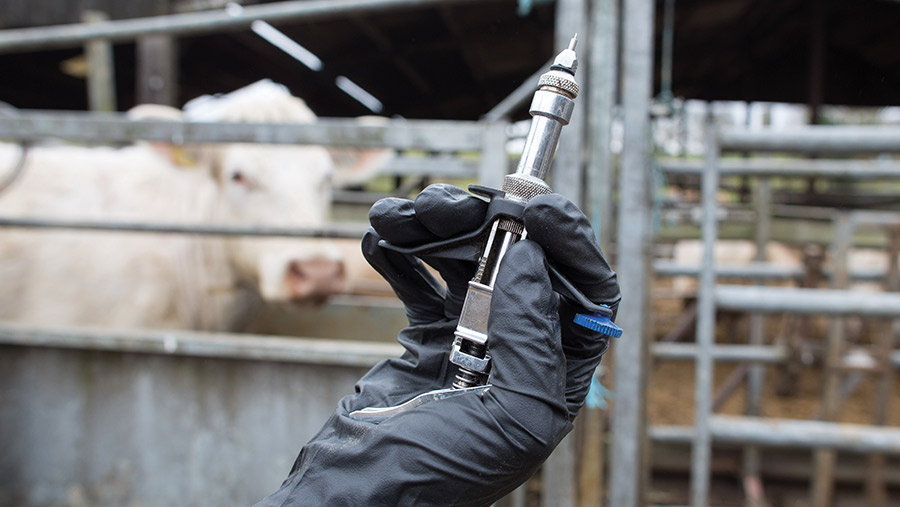Welsh unions reject table-based TB compensation
 © Tim Scrivener
© Tim Scrivener Farming unions in Wales have slammed proposals to introduce tabular valuations for cattle slaughtered to control bovine TB.
Both the Farmers’ Union of Wales (FUW) and NFU Cymru rejected the change in their responses to the Welsh government’s Refreshed TB Eradication Programme.
A consultation on the programme suggested the existing system of paying market prices, based on auctioneer valuations, was too costly.
See also: Farmers pick up pieces after triple storms chaos
In the proposals, the Welsh government said it could save £5.1m/year by switching to a payment scheme using a table of average prices.
This would be similar to England’s system, which publishes a table of payments for 51 different categories of cattle, the consultation said. Prices would be updated according to sales data to reflect pedigree and commercial cattle values.
But compensation payments could drop by more than 25% for beef and dairy producers.
Although the proposals offered a 10% uplift in the tabular value for herds registered with a health accreditation body, both unions were opposed.
Categoric rejection
NFU Cymru said it categorically rejected a table system. It stressed that the only fair way to value cattle compulsorily slaughtered was on the basis of their individual merits.
Union president Aled Jones explained tabular systems had shortcomings.
“A tabular valuation system is not fair to the farmer or to government. Any system based on averages is likely to create as many instances of overvaluation as undervaluation,” Mr Jones pointed out.
“A table valuation system takes no account of many important factors relating to the individual characteristics of the animal.
“For example, size, weight, quality, stage of pregnancy, milk yield, genetic merit or animal health status.”
He also suggested that a tabular system would penalise farmers who were trying to increase their resilience, improve productivity through the use of better-performing genetic stock.
And Mr Jones said compensation for a TB reactor did not cover the consequential effect of a breakdown, such as production losses, marketing restrictions, increased housing and feeding costs.
He added that the consultation document also set out changes to the current testing regime in the different TB regions of Wales. Mr Jones said that, if introduced, testing regime changes would have significant consequences for cattle keepers.
“For example, increasing the sensitivity of the TB testing regime will see more animals slaughtered and an increasing proportion will not have been exposed to the disease,” he said.
Conditions
NFU Cymru has set out three conditions that must be undertaken before the testing proposals are implemented:
- A comprehensive regulatory impact assessment and cost benefit analysis of the proposed changes on the cattle industry
- An opportunity for industry to consider further once these assessments have been completed
- The current compensation arrangements being maintained.
FUW issues mental health warning
The Farmers’ Union of Wales (FUW) has echoed the call for an impact assessment, arguing that it was unacceptable to issue proposals without any attempt to determine the expected effect on cattle welfare.
It also highlighted increased risks to human health and safety, both mental and physical, through increased handling for tests and stress.
Proposals to cut compensation payments added financial worries to the significant stress of a TB breakdown, the FUW said.
‘Serious mental decline’
The union’s animal health and welfare committee chairman, Ian Lloyd, warned that the increasing stress could prompt a serious decline in mental health among farmers.
Stress and anxiety endured during TB testing and fear of potential TB breakdowns continue to hammer the mental health of farmers and vets, Mr Lloyd said.
He cited figures showing that 50 agricultural workers in the UK committed suicide each year, while vets were three to four times more likely to take their own lives than other professions.
“Collectively, these proposals will create a culture of fear and anxiety and directly contradict the aims of the Well-being of Future Generations (Wales) Act 2015,” Mr Jones said. “This requires public bodies to think about the long-term effect of their decisions on the health, economy and communities of Wales.”
The lack of any impact assessment to establish the potentially catastrophic effects of the proposals was disrespectful to the farming community, Mr Lloyd concluded.
Full consultation
The consultation document can be viewed on the Welsh government website.
